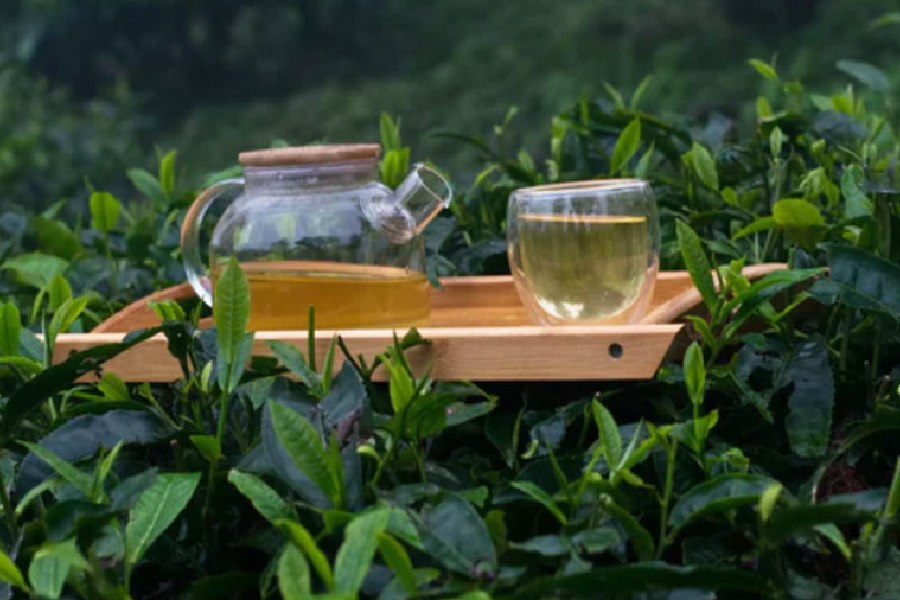Darjeeling Tea Industry: A Look At Current Concerns

Table of Contents
Climate Change and its Impact on Darjeeling Tea Production
The Darjeeling tea industry is intrinsically linked to its environment. Climate change significantly impacts tea production through unpredictable weather patterns. The delicate balance required for optimal Darjeeling tea growth is easily disrupted.
Shifting Weather Patterns
Unpredictable rainfall, frost, and extreme temperatures are increasingly impacting tea bush health and yield. These shifts create a volatile environment for tea cultivation.
- Reduced crop yields: Erratic weather patterns lead to lower harvests, impacting the overall supply and potentially increasing prices.
- Increased pest and disease outbreaks: Changes in temperature and humidity create favorable conditions for pests and diseases, damaging tea bushes and reducing the quality of the leaves.
- Altered leaf quality: Variations in temperature and rainfall directly affect the chemical composition of the tea leaves, influencing the final flavor and aroma of the Darjeeling tea. This can lead to inconsistencies in the quality of the final product.
These changes disrupt the delicate balance needed for optimal Darjeeling tea production, affecting both quantity and quality. The unique flavor profile of Darjeeling tea, prized worldwide, is directly threatened by these environmental shifts.
Sustainability Initiatives
The Darjeeling tea industry is actively exploring and implementing sustainable farming practices to mitigate the effects of climate change. These efforts are crucial for the long-term viability of the industry.
- Organic farming: Transitioning to organic farming methods reduces the reliance on chemical pesticides and fertilizers, minimizing environmental impact and improving soil health.
- Water conservation: Implementing efficient irrigation systems and water harvesting techniques are essential given the region's vulnerability to water scarcity.
- Reducing carbon footprint: Exploring renewable energy sources and minimizing waste generation are key steps towards reducing the industry's environmental footprint.
However, implementing these initiatives faces challenges, including the high initial investment costs and the need for widespread adoption across the industry. Success hinges on collaborative efforts between tea estates, government agencies, and research institutions.
The Challenges of Maintaining Quality and Authenticity
The reputation of Darjeeling tea is built on its unique quality and authenticity. However, several factors threaten to undermine this hard-earned reputation.
Counterfeit Darjeeling Tea
The market is flooded with counterfeit Darjeeling tea, significantly impacting the industry. This fraudulent tea undermines the reputation and price of genuine Darjeeling, creating substantial economic losses for legitimate producers.
- Methods of identifying counterfeit teas: Consumers need education on how to distinguish genuine Darjeeling tea from imitations, looking at certifications, packaging, and sensory characteristics.
- Consumer awareness: Raising consumer awareness about counterfeit products is paramount to protecting the market share of authentic Darjeeling tea.
- Regulatory challenges: Stricter regulations and enforcement are needed to combat the production and sale of counterfeit Darjeeling tea.
The economic and reputational damage caused by counterfeit products is significant. Protecting the authenticity of Darjeeling tea is crucial for its continued success.
Maintaining Traditional Production Methods
Preserving traditional Darjeeling tea production methods is vital for maintaining its unique flavor profile. This involves the safeguarding of traditional knowledge and expertise.
- Passing down knowledge to younger generations: Investing in training programs to ensure the continuation of traditional tea-making skills is crucial.
- Supporting local farmers: Providing support and fair prices to small-scale farmers ensures the survival of traditional tea gardens and cultivation techniques.
- Preserving traditional tea gardens: Protecting and conserving the existing tea gardens is essential for maintaining the unique terroir that contributes to Darjeeling tea's distinct flavor.
The cultural and economic significance of these traditional practices cannot be overstated. Their preservation is integral to the future of the Darjeeling tea industry.
Economic Pressures and Market Fluctuations
The Darjeeling tea industry faces significant economic challenges, including intense global competition and market volatility.
Global Competition
The increased competition from other tea-producing regions worldwide poses a significant threat to Darjeeling tea's market share. Adapting to this competitive landscape is essential for survival.
- Pricing strategies: Developing competitive pricing strategies that reflect the quality and uniqueness of Darjeeling tea is crucial.
- Marketing challenges: Effective marketing campaigns are needed to highlight the unique attributes of Darjeeling tea and differentiate it from competitors.
- Diversification of products: Exploring new product lines, such as specialty teas or tea-infused products, can help expand the market reach.
The Darjeeling tea industry needs to adapt to the changing global market by emphasizing its unique selling points and diversifying its offerings.
Labor and Fair Trade Concerns
Ensuring fair wages, worker rights, and sustainable employment within the Darjeeling tea industry is essential for its ethical and long-term success.
- Improving working conditions: Creating better working conditions and fair labor practices is essential for attracting and retaining skilled workers.
- Fair trade certification: Obtaining fair trade certifications can enhance the industry’s reputation and attract ethically conscious consumers.
- Addressing labor disputes: Open communication and collaborative efforts are needed to resolve labor disputes and ensure a harmonious working environment.
Ethical sourcing and fair trade practices are not merely ethical considerations but also contribute to the long-term sustainability and success of the Darjeeling tea industry.
Conclusion
The Darjeeling tea industry faces significant challenges, but its future is not without hope. Addressing climate change impacts through sustainable practices, combating counterfeit products, navigating global market fluctuations, and prioritizing fair labor practices are all essential steps towards ensuring the legacy of this iconic beverage. By understanding and actively addressing these concerns, we can collectively work towards ensuring the future of the Darjeeling tea industry and the unique flavor profile that sets it apart. Learn more about the ongoing efforts to protect the Darjeeling tea industry and support ethical sourcing by exploring resources dedicated to sustainable tea production. Let's work together to safeguard this treasured industry.

Featured Posts
-
 Is Gigi Hadid The Reason For Bradley Cooper And Leonardo Di Caprios Falling Out
May 05, 2025
Is Gigi Hadid The Reason For Bradley Cooper And Leonardo Di Caprios Falling Out
May 05, 2025 -
 Christian Horner On Max Verstappens Paternity A Witty Comment
May 05, 2025
Christian Horner On Max Verstappens Paternity A Witty Comment
May 05, 2025 -
 Why 10 Year Mortgages Arent Popular In Canada
May 05, 2025
Why 10 Year Mortgages Arent Popular In Canada
May 05, 2025 -
 Ford Extends Kentucky Derby Partnership A Multi Year Agreement
May 05, 2025
Ford Extends Kentucky Derby Partnership A Multi Year Agreement
May 05, 2025 -
 Darsham Gonzalez And Kade Salzer Win Sg Presidency Despite Popular Vote Disqualification
May 05, 2025
Darsham Gonzalez And Kade Salzer Win Sg Presidency Despite Popular Vote Disqualification
May 05, 2025
Latest Posts
-
 Ufc Bogeymans Controversial Knockout Mc Gregor Sparring Partner Falls In Epic Seven Fight Run
May 05, 2025
Ufc Bogeymans Controversial Knockout Mc Gregor Sparring Partner Falls In Epic Seven Fight Run
May 05, 2025 -
 Unclothed Image Of Bianca Censori Kanye Wests Film Promotion Strategy
May 05, 2025
Unclothed Image Of Bianca Censori Kanye Wests Film Promotion Strategy
May 05, 2025 -
 Bianca Censoris New Film Kanye Wests Unconventional Marketing
May 05, 2025
Bianca Censoris New Film Kanye Wests Unconventional Marketing
May 05, 2025 -
 Kanye Wests Controversial Bianca Censori Film Promotion
May 05, 2025
Kanye Wests Controversial Bianca Censori Film Promotion
May 05, 2025 -
 Kanye West And Bianca Censoris Marriage Challenges And Progress
May 05, 2025
Kanye West And Bianca Censoris Marriage Challenges And Progress
May 05, 2025
